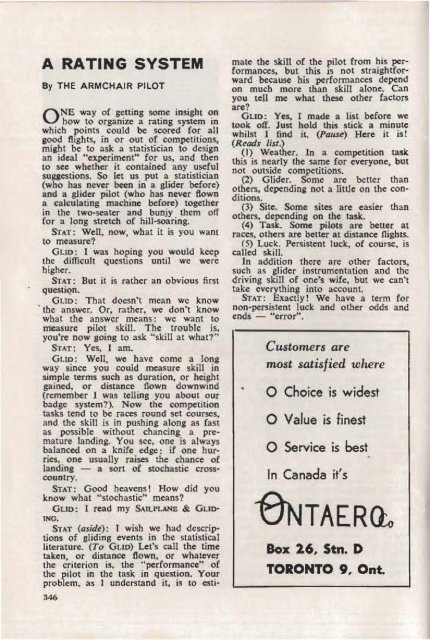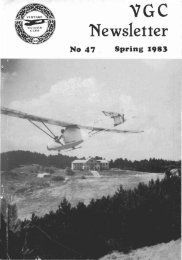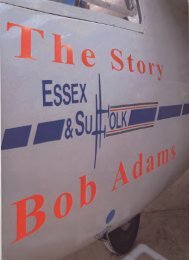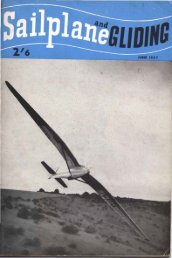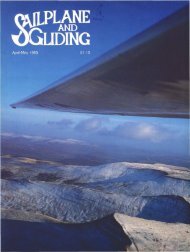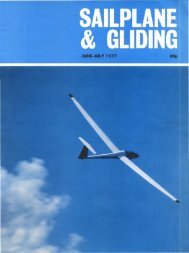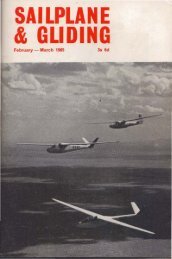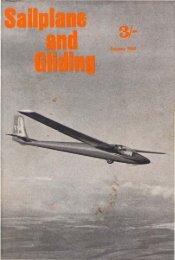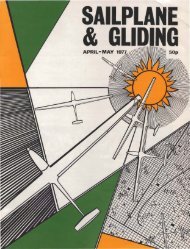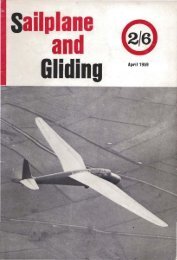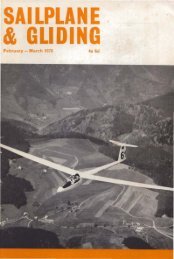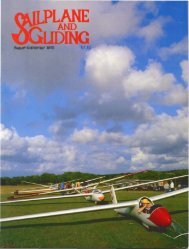Sailplane & Gliding 1966 - Lakes Gliding Club
Sailplane & Gliding 1966 - Lakes Gliding Club
Sailplane & Gliding 1966 - Lakes Gliding Club
Create successful ePaper yourself
Turn your PDF publications into a flip-book with our unique Google optimized e-Paper software.
A RATING SYSTEM<br />
By THE ARMCHAIR PILOT<br />
NE way of getting some insight on<br />
O how to organize a rating system in<br />
which points could be scored for all<br />
good flights, in or out. o~ .competitio.ns,<br />
might be to ask a statIstIcIan to deSign<br />
an ideal "experiment" for us, and then<br />
to see whether it contained any useful<br />
suggestions. So let us put a statistician<br />
(who has never been in a glider before)<br />
and a glider pilot (who has never flown<br />
a calculating machine before) together<br />
in the two-seater and bunjy them off<br />
for a long stretch of hill-soaring.<br />
STH: Well, now, what it is you want<br />
to measure?<br />
GLlO: I was hoping you would keep<br />
the difficult questions until we were<br />
higher.<br />
STAT: But it is rather an obvious first<br />
questiqn.<br />
GLTo: That doesn't mean we know<br />
. the answer. Or, rather, we don't know<br />
what the answer means: we want to<br />
measure pilot skill. The trouble is,<br />
you're now going to ask "skill at what?"<br />
STAT: Yes, I am.<br />
GLlO: Well we have come a long<br />
way since you could measure skill in<br />
simple terms such as duration, or hei~ht<br />
gained, or distance flown downwmd<br />
(remember I was telling you about our<br />
badge system?). Now the competition<br />
tasks tend to be races round set courses,<br />
and the skill is in pushing along as fast<br />
as possible without chancing a premature<br />
landing. You see, one is always<br />
balanced on a knife edge: if one hurries,<br />
one usually raises the chance of<br />
landing -<br />
country.<br />
a sort of stochastic cross<br />
STAT: Good heavens! How did you<br />
know what "stochastic" meilns?<br />
GLlO: I read my SAILPLANE & GUD<br />
ING.<br />
STAT (aside): I wish we had descriptions<br />
of gliding events in the statistical<br />
literature. (To GL10) Let's call the time<br />
taken or distance flown, or whatever<br />
the criterion is, the "performance" of<br />
346<br />
the pilot in the task in q~est!on. You.r<br />
problem, as I understand It, IS to estl-<br />
mate the skill of the pilot from ~is performances,<br />
but this is not straIghtforward<br />
because his performances depend<br />
on much more than skill alone. Can<br />
you tell me what these otber factors<br />
are?<br />
GLlO: Yes, I made a list before we<br />
took off. Just hold this stick a minute<br />
whilst I find it. (Pause) Here it is!<br />
(Reads list.)<br />
(I) Weather. In a competition task<br />
this is nearly the same for everyone, but<br />
not outside competitions.<br />
(2) Glider. Some are better tban<br />
others, depending not a little on the conditions.<br />
(3) Site. Some sites are easier than<br />
others, depending on the task.<br />
(4) Task. Some pilots are better at<br />
races, others are better at distance flights.<br />
(5) Luck. Persistent luck, of course, is<br />
called skill.<br />
In addition there are other factors,<br />
such as glider instrumentation and the<br />
driving skill of one's wife, but we can't<br />
take everything into account.<br />
STAT: Exactly! We have a term for<br />
non-.persistent luck and other odds and<br />
ends - "error".<br />
Customers are<br />
most satisfied where<br />
o Choice is widest<br />
o Value is finest<br />
o Service is best<br />
In Canada it's<br />
B'NTAERQ.<br />
Box 2.6. Stn. D<br />
TORONTO 9. Onto


